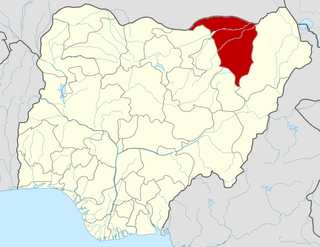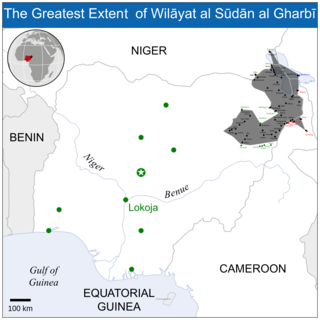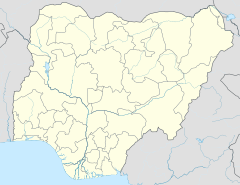
Maiduguri is the capital and the largest city of Borno State in north-eastern Nigeria, on the continent of Africa. The city sits along the seasonal Ngadda River which disappears into the Firki swamps in the areas around Lake Chad. Maiduguri was founded in 1907 as a military outpost by the British Empire during the colonial period. As of 2022, Maiduguri is estimated to have a population of approximately two million in the metropolitan area.

Goodluck Ebele Azikiwe Jonathan is a Nigerian politician who served as the president of Nigeria from 2010 to 2015. He lost the 2015 presidential election to former military head of state General Muhammadu Buhari and was the first incumbent president in Nigerian history to concede defeat in an election and therefore allow for a peaceful transition of power.

Boko Haram, officially known as Jamā'at Ahl as-Sunnah lid-Da'wah wa'l-Jihād, is an Islamist jihadist organization based in northeastern Nigeria, which is also active in Chad, Niger, northern Cameroon, and Mali. In 2016, the group split, resulting in the emergence of a hostile faction known as the Islamic State's West Africa Province.

Gwoza is a local government area of Borno State, Nigeria. Its headquarters are in the town of Gwoza, a border town "about 135 kilometres South-East of Maiduguri." The postal code of the area is 610.

The Boko Haram insurgency began in July 2009, when the militant Islamist and jihadist rebel group Boko Haram started an armed rebellion against the government of Nigeria. The conflict is taking place within the context of long-standing issues of religious violence between Nigeria's Muslim and Christian communities, and the insurgents' ultimate aim is to establish an Islamic state in the region.
Baga is a town in the northeastern Nigerian state of Borno, close to Lake Chad, and lying northeast of the town of Kukawa. It is located within the Kukawa Local Government Area.
The Baga massacre began on 16 April 2013 in the village of Baga, Nigeria, in Borno State, when as many as 200 civilians were killed, hundreds wounded, and over 2,000 houses and businesses worth millions of Naira were destroyed. Refugees, civilians officials, and human rights organizations accused the Nigerian Military of carrying out the massacre; some military officials blamed the insurgent group Boko Haram.
Timeline of the Boko Haram insurgency is the chronology of the Boko Haram insurgency, an ongoing armed conflict between Nigerian Islamist group Boko Haram and the Nigerian government. Boko Haram have carried out many attacks against the military, police and civilians since 2009, mostly in Nigeria. The low-intensity conflict is centred on Borno State. It peaked in the mid 2010s, when Boko Haram extended their insurgency into Cameroon, Chad and Niger.
The Konduga massacre took place in Konduga, Borno State, Nigeria on 11 February 2014. The massacre was conducted by Boko Haram Islamists against Christian villagers. At least 62 people were killed.

On February 25, 2014, fifty-nine boys were killed at the Federal Government College of Buni Yadi in Yobe State, Nigeria. The twenty-four buildings of the school were also burned down as a result of the attack. No group has claimed responsibility for the attack, but according to media and local officials the Islamist militants Boko Haram are suspected to be behind the attack.

On the night of 14–15 April 2014, 276 mostly Christian female students aged from 16 to 18 were kidnapped by the Islamic terrorist group Boko Haram from the Government Girls Secondary School at the town of Chibok in Borno State, Nigeria. Prior to the raid, the school had been closed for four weeks due to deteriorating security conditions, but the girls were in attendance in order to take final exams in physics.
From 20 to 23 June 2014, a series of attacks occurred in Borno State, Nigeria. 91 women and children were kidnapped in the attacks and more than 70 people were killed.
The following lists events from 2014 in Nigeria.
The following lists events that happened during 2015 in Nigeria.

The Multinational Joint Task Force (MNJTF) is a combined multinational formation, comprising units, mostly military, from Benin, Cameroon, Chad, Niger, and Nigeria. It is headquartered in N'Djamena and is mandated to bring an end to the Boko Haram insurgency.
The following lists events that happened during 2015 in Chad.

Starting in late January 2015, a coalition of West African troops launched an offensive against the Boko Haram insurgents in Nigeria.
On three days immediately before and during Ramadan, 2015, four attacks struck Chad's capital N'Djamena. Three suicide attacks against two police targets killed 33 people on 15 June, five policemen and six terrorists were killed during a police raid on 27 Jun, and a suicide bomber killed 15 in N'Djamena's main market, on 11 July.

The Chad Basin campaign of 2018–2020 was a series of battles and offensives in the southern Chad Basin, particularly northeastern Nigeria, which took place amid the ongoing Boko Haram insurgency. The Chad Basin witnessed an upsurge of insurgent activity from early November 2018, as rebels belonging to the Islamic State's West Africa Province (ISWAP) and Boko Haram launched offensives and several raids to regain military strength and seize territory in a renewed attempt to establish an Islamic state in the region. These attacks, especially those by ISWAP, met with considerable success and resulted in the displacement of hundreds of thousands of civilians. The member states of the Multinational Joint Task Force (MJTF), namely Nigeria, Niger, Chad, and Cameroon responded to the increased insurgent activity with counter-offensives. These operations repulsed the rebels in many areas but failed to fully contain the insurgency.

The Koshebe massacre took place on 28 November 2020 in the village of Koshebe, Nigeria, in Borno State, when as many as 110 civilians and peasant farmers were killed and six were wounded as they worked in rice fields in Koshebe village, near the northeast Nigerian city of Maiduguri. The attack was thought to be carried out by the Boko Haram insurgency. About 15 women were also kidnapped.












